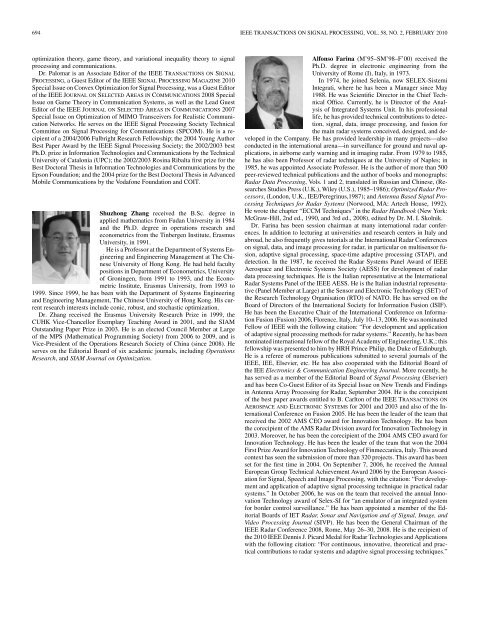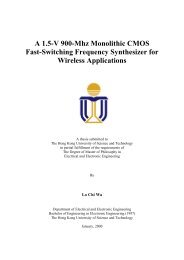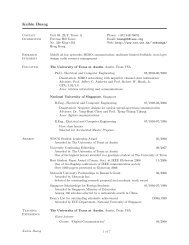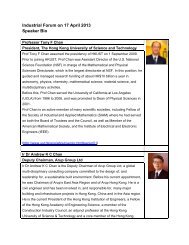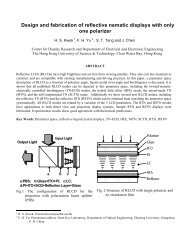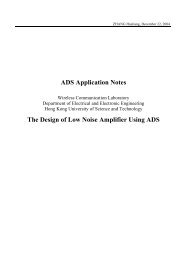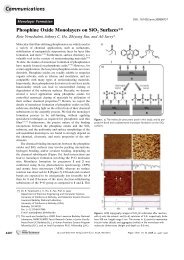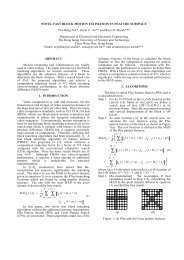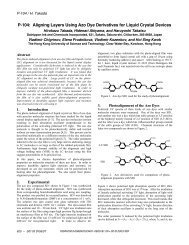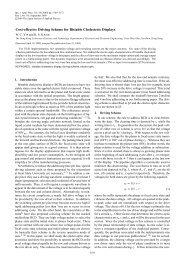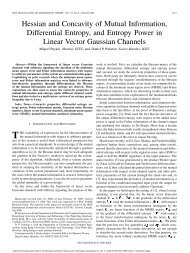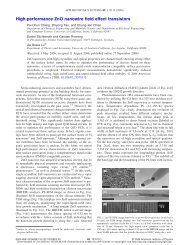Code Design for Radar STAP via Optimization Theory
Code Design for Radar STAP via Optimization Theory
Code Design for Radar STAP via Optimization Theory
Create successful ePaper yourself
Turn your PDF publications into a flip-book with our unique Google optimized e-Paper software.
694 IEEE TRANSACTIONS ON SIGNAL PROCESSING, VOL. 58, NO. 2, FEBRUARY 2010optimization theory, game theory, and variational inequality theory to signalprocessing and communications.Dr. Palomar is an Associate Editor of the IEEE TRANSACTIONS ON SIGNALPROCESSING, a Guest Editor of the IEEE SIGNAL PROCESSING MAGAZINE 2010Special Issue on Convex <strong>Optimization</strong> <strong>for</strong> Signal Processing, was a Guest Editorof the IEEE JOURNAL ON SELECTED AREAS IN COMMUNICATIONS 2008 SpecialIssue on Game <strong>Theory</strong> in Communication Systems, as well as the Lead GuestEditor of the IEEE JOURNAL ON SELECTED AREAS IN COMMUNICATIONS 2007Special Issue on <strong>Optimization</strong> of MIMO Transceivers <strong>for</strong> Realistic CommunicationNetworks. He serves on the IEEE Signal Processing Society TechnicalCommittee on Signal Processing <strong>for</strong> Communications (SPCOM). He is a recipientof a 2004/2006 Fulbright Research Fellowship; the 2004 Young AuthorBest Paper Award by the IEEE Signal Processing Society; the 2002/2003 bestPh.D. prize in In<strong>for</strong>mation Technologies and Communications by the TechnicalUniversity of Catalonia (UPC); the 2002/2003 Rosina Ribalta first prize <strong>for</strong> theBest Doctoral Thesis in In<strong>for</strong>mation Technologies and Communications by theEpson Foundation; and the 2004 prize <strong>for</strong> the Best Doctoral Thesis in AdvancedMobile Communications by the Vodafone Foundation and COIT.Shuzhong Zhang received the B.Sc. degree inapplied mathematics from Fudan University in 1984and the Ph.D. degree in operations research andeconometrics from the Tinbergen Institute, ErasmusUniversity, in 1991.He is a Professor at the Department of Systems Engineeringand Engineering Management at The ChineseUniversity of Hong Kong. He had held facultypositions in Department of Econometrics, Universityof Groningen, from 1991 to 1993, and the EconometricInstitute, Erasmus University, from 1993 to1999. Since 1999, he has been with the Department of Systems Engineeringand Engineering Management, The Chinese University of Hong Kong. His currentresearch interests include conic, robust, and stochastic optimization.Dr. Zhang received the Erasmus University Research Prize in 1999, theCUHK Vice-Chancellor Exemplary Teaching Award in 2001, and the SIAMOutstanding Paper Prize in 2003. He is an elected Council Member at Largeof the MPS (Mathematical Programming Society) from 2006 to 2009, and isVice-President of the Operations Research Society of China (since 2008). Heserves on the Editorial Board of six academic journals, including OperationsResearch, and SIAM Journal on <strong>Optimization</strong>.Alfonso Farina (M’95–SM’98–F’00) received thePh.D. degree in electronic engineering from theUniversity of Rome (I), Italy, in 1973.In 1974, he joined Selenia, now SELEX-SistemiIntegrati, where he has been a Manager since May1988. He was Scientific Director in the Chief TechnicalOffice. Currently, he is Director of the Analysisof Integrated Systems Unit. In his professionallife, he has provided technical contributions to detection,signal, data, image processing, and fusion <strong>for</strong>the main radar systems conceived, designed, and developedin the Company. He has provided leadership in many projects—alsoconducted in the international arena—in surveillance <strong>for</strong> ground and naval applications,in airborne early warning and in imaging radar. From 1979 to 1985,he has also been Professor of radar techniques at the University of Naples; in1985, he was appointed Associate Professor. He is the author of more than 500peer-reviewed technical publications and the author of books and monographs:<strong>Radar</strong> Data Processing, Vols. 1 and 2, translated in Russian and Chinese, (ResearchesStudies Press (U.K.), Wiley (U.S.), 1985–1986); Optimized <strong>Radar</strong> Processors,(London, U.K., IEE/Peregrinus,1987); and Antenna Based Signal ProcessingTechniques <strong>for</strong> <strong>Radar</strong> Systems (Norwood, MA: Artech House, 1992).He wrote the chapter “ECCM Techniques” in the <strong>Radar</strong> Handbook (New York:McGraw-Hill, 2nd ed., 1990, and 3rd ed., 2008), edited by Dr. M. I. Skolnik.Dr. Farina has been session chairman at many international radar conferences.In addition to lecturing at universities and research centers in Italy andabroad, he also frequently gives tutorials at the International <strong>Radar</strong> Conferenceson signal, data, and image processing <strong>for</strong> radar, in particular on multisensor fusion,adaptive signal processing, space-time adaptive processing (<strong>STAP</strong>), anddetection. In the 1987, he received the <strong>Radar</strong> Systems Panel Award of IEEEAerospace and Electronic Systems Society (AESS) <strong>for</strong> development of radardata processing techniques. He is the Italian representative at the International<strong>Radar</strong> Systems Panel of the IEEE AESS. He is the Italian industrial representative(Panel Member at Large) at the Sensor and Electronic Technology (SET) ofthe Research Technology Organisation (RTO) of NATO. He has served on theBoard of Directors of the International Society <strong>for</strong> In<strong>for</strong>mation Fusion (ISIF).He has been the Executive Chair of the International Conference on In<strong>for</strong>mationFusion (Fusion) 2006, Florence, Italy, July 10–13, 2006. He was nominatedFellow of IEEE with the following citation: “For development and applicationof adaptive signal processing methods <strong>for</strong> radar systems.” Recently, he has beennominated international fellow of the Royal Academy of Engineering, U.K.; thisfellowship was presented to him by HRH Prince Philip, the Duke of Edinburgh.He is a referee of numerous publications submitted to several journals of theIEEE, IEE, Elsevier, etc. He has also cooperated with the Editorial Board ofthe IEE Electronics & Communication Engineering Journal. More recently, hehas served as a member of the Editorial Board of Signal Processing (Elsevier)and has been Co-Guest Editor of its Special Issue on New Trends and Findingsin Antenna Array Processing <strong>for</strong> <strong>Radar</strong>, September 2004. He is the corecipientof the best paper awards entitled to B. Carlton of the IEEE TRANSACTIONS ONAEROSPACE AND ELECTRONIC SYSTEMS <strong>for</strong> 2001 and 2003 and also of the InternationalConference on Fusion 2005. He has been the leader of the team thatreceived the 2002 AMS CEO award <strong>for</strong> Innovation Technology. He has beenthe corecipient of the AMS <strong>Radar</strong> Division award <strong>for</strong> Innovation Technology in2003. Moreover, he has been the corecipient of the 2004 AMS CEO award <strong>for</strong>Innovation Technology. He has been the leader of the team that won the 2004First Prize Award <strong>for</strong> Innovation Technology of Finmeccanica, Italy. This awardcontext has seen the submission of more than 320 projects. This award has beenset <strong>for</strong> the first time in 2004. On September 7, 2006, he received the AnnualEuropean Group Technical Achievement Award 2006 by the European Association<strong>for</strong> Signal, Speech and Image Processing, with the citation: “For developmentand application of adaptive signal processing technique in practical radarsystems.” In October 2006, he was on the team that received the annual InnovationTechnology award of Selex-SI <strong>for</strong> “an emulator of an integrated system<strong>for</strong> border control surveillance.” He has been appointed a member of the EditorialBoards of IET <strong>Radar</strong>, Sonar and Navigation and of Signal, Image, andVideo Processing Journal (SIVP). He has been the General Chairman of theIEEE <strong>Radar</strong> Conference 2008, Rome, May 26–30, 2008. He is the recipient ofthe 2010 IEEE Dennis J. Picard Medal <strong>for</strong> <strong>Radar</strong> Technologies and Applicationswith the following citation: “For continuous, innovative, theoretical and practicalcontributions to radar systems and adaptive signal processing techniques.”


